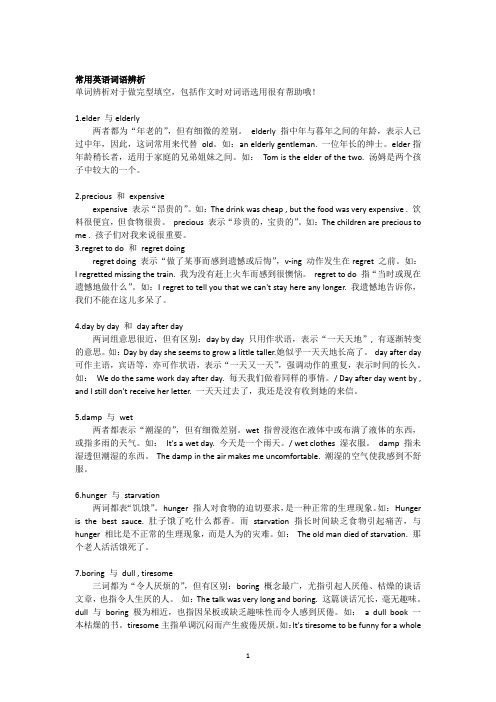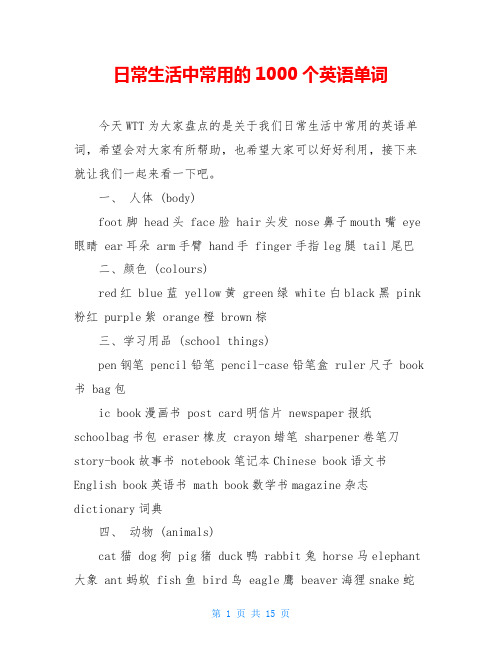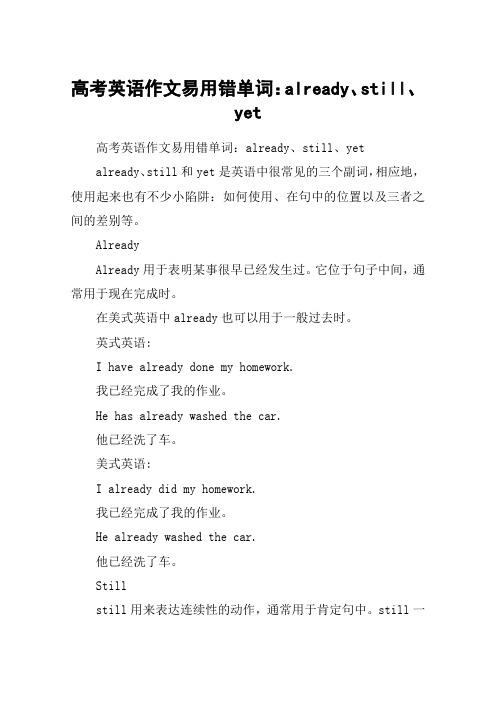我们常用错的英语单词
容易误解的英语单词

有些英语单词容易被误解,因为它们在不同的语境中可能有不同的含义,或者它们的翻译可能与中文的习惯表达有所不同。
以下是一些常见的容易被误解的英语单词:
Restroom:这个单词并不表示“休息室”,而是指“厕所”。
Fair:这个单词并不总是表示“公平”,它还可以表示“博览会”或“集市”。
Love:这个单词在英文中非常常用,但它并不总是表示“爱情”。
它也可以表示“喜欢”或“热爱”。
Date:这个单词并不一定指“约会”,它也可以表示“日期”或“时间”。
Deadline:这个单词并不一定指“死亡线”,而是指“截止日期”。
Event:这个单词并不一定总是表示“大事件”,它也可以表示“活动”或“比赛”。
Gift:这个单词并不一定总是表示“礼物”,它也可以表示“天赋”或“才能”。
Nice:这个单词并不一定总是表示“好”,它也可以表示“友好”或“令人愉快的”。
Sick:这个单词并不一定总是表示“生病的”,它也可以表示“不舒服的”或“感到恶心的”。
Will:这个单词并不一定总是表示“将”,它也可以表示“遗嘱”或“意愿”。
最常用英语词语辨析

常用英语词语辨析单词辨析对于做完型填空,包括作文时对词语选用很有帮助哦!1.elder 与elderly两者都为“年老的”,但有细微的差别。
elderly 指中年与暮年之间的年龄,表示人已过中年,因此,这词常用来代替old。
如:an elderly gentleman. 一位年长的绅士。
elder指年龄稍长者,适用于家庭的兄弟姐妹之间。
如:Tom is the elder of the two. 汤姆是两个孩子中较大的一个。
2.precious 和expensiveexpensive 表示“昂贵的”。
如:The drink was cheap , but the food was very expensive . 饮料很便宜,但食物很贵。
precious 表示“珍贵的,宝贵的”。
如:The children are precious to me . 孩子们对我来说很重要。
3.regret to do 和regret doingregret doing 表示“做了某事而感到遗憾或后悔”,v-ing 动作发生在regret 之前。
如:I regretted missing the train. 我为没有赶上火车而感到很懊恼。
regret to do 指“当时或现在遗憾地做什么”。
如:I regret to tell you that we can't stay here any longer. 我遗憾地告诉你,我们不能在这儿多呆了。
4.day by day 和day after day两词组意思很近,但有区别:day by day 只用作状语,表示“一天天地”, 有逐渐转变的意思。
如:Day by day she seems to grow a little taller.她似乎一天天地长高了。
day after day 可作主语,宾语等,亦可作状语,表示“一天又一天”,强调动作的重复,表示时间的长久。
常见英语语法错误

常见英语语法错误1.句子成分残缺不全We always working till late at night before taking exams.(误)We are always working /We always work till late at night before taking exams(正)We should read books may be useful to us. (误)We should read books which may be useful to us. (正)2.句子成分多余This test is end, but there is another test is waiting for you. (误)One test ends, but another is waiting for you. (正)The driver of the red car was died on the spot. (误)The driver of the red car died on the spot. (正)3.主谓不一致Someone/Somebody think that reading should be selective. (误)Some think that reading should be selective. (正)My sister go to the cinema at least once a week. (误)My sister goes to the cinema at least once a week. (正)4.动词时态、语态的误用I was walking along the road, and there are not so many cars on the street. (误)I was walking along the road and there were not so many vehicles on the street. (正)We have little time to read some books which we interest. (误)We have little time to read some books in which we are interested. (正)I am a student who has studying in the college for two years. (误)I have been studying in the college for two years(正)5.词类混淆It is my point that reading must be selectively. (误)In my opinion, reading must be selective. (正)Honest is so important for everyperson. (误)Honesty is so important for everyone. (正)The old man was hit by a car when he across the street. (误)The old man was hit by a car when he was crossing the street. (正)6.名词可数与不可数的误用Too much tests are disadvan tage for students’ study. (误)Too many tests are disadvantageous to students. (正)In modern society, people are under various pressures(误)In modern society, people are under various kinds of pressure. (正)7.动词及物与不及物的误用The traffic accident was taken place at the junction of two highways. (误)The traffic accident took place at the junction of two highways. (正)Because of his excellent performance, the boss rose his salary. (误)Because of his excellent performance, the boss raised his salary. (正)8.介词to和不定式符号的混淆Too many tests will do harm to cultivate our independent thinking. (误)Too many tests will do harm to the cultivation of our independent thinking. (正)All these contributed to solve the serious problem. (误)All these contributed to the solution to the serious problem. (正)9.情态动词的误用It may not good to our health. (误)It may be not good to our health. (正)They should spent much time. (误)They should spend much time. (正)10. There be句型的误用There exists some new problems such as being dishonest. (误)There exist/arise some new problems such as being dishonest. (正)There are many way to solve the tuition and fees of college education. (误)There are many ways to raise the money for the tuition and fees for college educatio n. (正)1.动宾搭配不当We must pay attention to it and make solutions to the problem. (误)We must pay attention and find a solution to the problem. (正)It also may help you to make success. (误)It may also help you succeed/obtain your goal. (正)2.根据中文逐字硬译If so meone’s family situation is not well, he can apply for loan to bank. (误)If one’s family is not well off, he can apply to the bank for a loan. (正)Let alone touch the outside world of campus/keep a good body health(误)Let alone get in touch with the world outside of the campus/keep fit(正)上面这些错误比较典型、集中,请大家务必要注意,其他的错误,如单词拼写、大小写、标点符号的误用等,可谓千姿百态,无奇不有,在此就不一一列举。
日常生活中常用的1000个英语单词

日常生活中常用的1000个英语单词今天WTT为大家盘点的是关于我们日常生活中常用的英语单词,希望会对大家有所帮助,也希望大家可以好好利用,接下来就让我们一起来看一下吧。
一、人体 (body)foot脚 head头 face脸 hair头发 nose鼻子mouth嘴 eye 眼睛 ear耳朵 arm手臂 hand手 finger手指leg腿 tail尾巴二、颜色 (colours)red红 blue蓝 yellow黄 green绿 white白black黑 pink 粉红 purple紫 orange橙 brown棕三、学习用品 (school things)pen钢笔 pencil铅笔 pencil-case铅笔盒 ruler尺子 book 书 bag包ic book漫画书 post card明信片 newspaper报纸schoolbag书包 eraser橡皮 crayon蜡笔 sharpener卷笔刀story-book故事书 notebook笔记本Chinese book语文书English book英语书 math book数学书magazine杂志dictionary词典四、动物 (animals)cat猫 dog狗 pig猪 duck鸭 rabbit兔 horse马elephant 大象 ant蚂蚁 fish鱼 bird鸟 eagle鹰 beaver海狸snake蛇mouse老鼠 squirrel松鼠 kangaroo袋鼠 monkey猴 panda熊猫bear熊 lion狮子 tiger老虎 fox狐狸 zebra斑马 deer鹿giraffe长颈鹿 goose鹅hen母鸡 turkey火鸡 lamb小羊 sheep 绵羊 goat山羊 cow奶牛 donkey驴 squid鱿鱼lobster龙虾shark鲨鱼 seal海豹 sperm whale抹香鲸 killer whale虎鲸五、人物 (people)friend朋友 boy男孩 girl女孩 mother母亲 father父亲sister姐妹 brother兄弟 uncle叔叔;舅舅man男人 woman女人 Mr.先生 Miss小姐 lady女士; mom妈妈 dad爸爸 parents父母grandparents祖父母grandma/grandmother(外)祖母grandpa/grandfather(外)祖父aunt姑姑 cousin堂(表)兄弟;堂(表)姐妹son儿子 daughter女儿 baby婴儿 kid小孩classmate同学 queen女王 visitor参观者 neighbour邻居principal校长 university student大学生pen pal笔友 tourist旅行者people人物robot机器人六、食品、饮料 (food &; drink)rice米饭 bread面包 beef牛肉 milk牛奶 water水 egg蛋fish鱼 tofu豆腐cake蛋糕hot dog热狗 hamburger汉堡包French fries炸薯条cookie曲奇 biscuit饼干 jam果酱noodles面条meat肉 chicken鸡肉 pork猪肉 mutton羊肉vegetable蔬菜 salad沙拉 soup汤ice冰 ice-cream冰淇淋Coke可乐 juice果汁 tea茶 coffee咖啡breakfast早餐 lunch 午餐 dinner/supper晚餐 meal一餐七、职业 (jobs)teacher教师 student学生 doctor医生 nurse护士 driver 司机 farmer农民singer歌唱家 writer作家 actor男演员actress女演员 artist画家TV reporter电视台记者 engineer 工程师 accountant会计policeman(男)警察salesperson销售员cleaner清洁工baseball player棒球运动员 assistant售货员police警察八、水果、蔬菜 (fruit &; vegetables)apple苹果 banana香蕉 pear梨 orange橙 watermelon西瓜grape葡萄 eggplant茄子 green beans青豆 tomato西红柿potato土豆 peach桃 strawberry草莓cucumber黄瓜 onion洋葱 carrot胡萝卜 cabbage卷心菜九、衣服 (clothes)jacket夹克衫 shirt衬衫 T-shirt丅恤衫skirt短裙子dress连衣裙jeans牛仔裤 pants长裤 socks袜子 shoes鞋子sweater毛衣 coat上衣raincoat雨衣shorts短裤sneakers网球鞋 slippers拖鞋 sandals凉鞋 boots靴子hat(有沿的)帽子cap便帽 sunglasses太阳镜 tie领带 scarf围巾gloves手套trousers裤子 cloth布十、交通工具 (vehicles)bike自行车 bus公共汽车 train火车 boat小船 ship轮船yacht快艇car小汽车 taxi出租车 jeep吉普车 van小货车; plane/airplane飞机 subway / underground 地铁 motor cycle 摩托车十一、杂物 (other things)window窗户 door门 desk课桌 chair椅子 bed床puter计算机 board写字板 fan风扇 light灯teacher's desk讲台picture图画;照片 wall墙壁 floor地板curtain窗帘 trash bin垃圾箱 closet壁橱 mirror镜子 end table床头柜football/soccer足球 present礼物 walkman随身听 l台灯phone电话 sofa沙发 shelf书架 fridge冰箱 table桌子 TV电视 air-conditioner空调key钥匙 lock锁 photo照片 chart图表 plate盘子 knife刀 fork叉 spoon勺子 chopsticks筷子pot锅 gift礼物 toy玩具 doll洋娃娃ball球 balloon气球kite风筝 jigsaw puzzle拼图游戏box盒子 umbrella伞 zipper 拉链 violin小提琴 yo-yo溜溜球nest鸟窝 hole洞 tube管子toothbrush牙刷 menu菜单 e-card电子卡片 e-mail电子邮件traffic light交通灯 money钱 medicine药十二、地点 (locations)home家 room房间 bedroom卧室 bathroom卫生间 living room起居室kitchen厨房 classroom教室 school学校 park公园 library图书馆post office邮局 police office警察局hospital医院 cinema电影院bookstore书店 farm农场 zoo动物园 garden花园 study书房playground操场 canteen食堂 teacher's office教师办公室 library图书馆gym体育馆 washroom卫生间 art room绘画教室 puter room计算机教室 music room音乐教室 TV room电视机房 flat公寓 pany公司 factory工厂fruit stand水果摊pet shop宠物商店 nature park自然公园 theme park主题公园science museum科学博物馆 the Great Wall长城 supermarket 超市 bank银行country国家 village乡村 city城市 hometown 家乡bus stop公交车站十三、课程 (classes)sports体育运动 science科学 Moral Education思想品德课Social Studies社会Chinese语文 math数学 PE体育课 English 英语课十四、气象 (weather)cold寒冷的 warm温暖的 cool凉爽的 snowy下雪的 sunny 晴朗的hot炎热的 rainy下雨的 windy有风的 cloudy多云的weather report天气预报rain雨 cloud云 sun太阳 mountain 山 sky天空 rainbow彩虹 wind风 air空气moon月亮十五、国家、城市 (countries &; cities)China/PRC中国 America/USA美国 UK联合王国 England英国Canada/CAN加拿大 Australia澳大利亚 New York纽约London伦敦Sydney悉尼 Moscow莫斯科 Cairo开罗十六、景物 (nature)river河流 lake湖泊 stream河溪 forest森林 path小道road公路house房子 bridge桥 building建筑物十七、植物 (plants)flower花 grass草 tree树 seed种子 sprout苗 plant植物 rose玫瑰 leaf叶子十八、星期 (week)Monday星期一 Tuesday星期二 Wednesday星期三 Thursday 星期四Friday星期五 Saturday星期六 Sunday星期天 weekend 周末十九、月份 (months)Jan. (January)一月 Feb.(February)二月 Mar.(March)三月April四月May五月 June六月 July七月 Aug.(August)八月Sept.(September)九月Oct.(October)十月 Nov.(November)十一月 Dec.(December)十二月二十、季节 (seasons)spring春 summer夏 fall/autumn秋 winter冬二十一、方位 (directions)south南 north北 east东 west西 left 左边 right右边自微信公号:hzenglish.二十二、患病 (illness)have a fever发烧 hurt疼痛 have a cold感冒 have a toothache牙疼have a headache头疼 have a sore throat喉咙疼二十三、数词 (numbers)1 one2 two3 three4 four5 five6 six7 seven8 eight9 nine 10 ten二十四、形容词 (adj.)big大的 small小的 long长的 tall高的 short短的;矮的young年轻的old旧的;老的 strong健壮的 thin瘦的 active积极活跃的 quiet安静的nice好看的 kind和蔼亲切的 strict严格的 smart聪明的 funny滑稽可笑的tasty好吃的 sweet甜的salty咸的 sour酸的 fresh新鲜的 favourite最喜爱的clean 干净的 tired疲劳的 excited兴奋的 angry生气的 happy高兴的bored无聊的 sad忧愁的 taller更高的 shorter更矮的stronger更强壮的 older年龄更大的 younger更年轻的 bigger 更大的 heavier更重的 longer更长的thinner更瘦的 smaller 更小的 good好的 fine好的 great很好的 heavy 重的new新的fat胖的 happy快乐的 right对的 hungry饥饿的 cute逗人喜爱的little小的 lovely可爱的 beautiful漂亮的 colourful色彩鲜艳的 pretty漂亮的cheap便宜的 expensive昂贵的 juicy多汁的 tender嫩的 healthy健康的ill有病的 helpful有帮助的high高的 easy简单的 proud骄傲的 sick有病的better更好的higher更高的二十五、介词 (prep.)in在......里 on在......上;在......时候 under在......下面 near在......的旁边 behind在......后边 next to 与......相邻 over在......上面 in front of在......前面二十六、代词 (pron.)I我 we我们 you你;你们 he他 she她 it它 they他(她,它)们 my我的 our 我们的 your你的;你们的 his他的 her她的二十七、动词 (v.)play(.ed)玩;踢 swim(swam)游泳 skate滑冰 fly(flew)飞jump跳 walk走run(run)跑 climb爬 fight(fought)打架swing(swung)荡 eat(ate)吃sleep(slept)睡觉 like像,喜欢have(had)有;吃 turn转弯 buy(bought)买take(took)买;带live居住 teach(taught)教 go(went)去 study(studied)学习learn学习 sing(sang)唱歌 dance跳舞 row划 do(did)做 do homework做作业do housework做家务 watch TV看电视read(read) books读书cook the meals做饭 water the flowers 浇花 sweep(swept) the floor扫地clean the bedroom打扫卧室make(made) the bed铺床 set(set) the table摆饭桌 wash the clothes洗衣服 do the dishes洗碗碟 use a puter使用计算机do morning exercises晨练;做广播操 eat breakfast吃早饭 eat dinner吃晚饭go to school上学 have English class上英语课 play sports进行体育运动get(got)up起床 climb mountains爬山 go shopping买东西play the piano弹钢琴visit grandparents看望(外)祖父母 go hiking去远足fly kites放风筝 make a snowman堆雪人 plant trees种树draw(drew) pictures画画 cook dinner做饭 read a book看书answer the phone接电话 listen to music听音乐 clean the room打扫房间write(wrote) a letter写信 write an e-mail写电子邮件 drink(drank) water喝水take pictures照相 watch insects观察昆虫 pick up leaves采摘树叶meet(met)见面 wele 欢迎 thank谢谢 love爱 work工作 drink(drank)喝play puter games玩电脑游戏 play chess下棋 empty the trash倒垃圾do an experiment做实验 catch butterflies捉蝴蝶 count insects数昆虫collect insects收集昆虫 collect leaves收集树叶 write a report写报告play chess下棋 have a picnic举行野餐 get to到达 ride(rode) a bike骑自行车 play the violin拉小提琴 make kites制作风筝 collect sts集邮put away the clothes收拾衣服 get off下车 take a trip去旅行read a magazine阅读杂志 go to the cinema去看电影 gostraight向前直走taste尝 smell闻 feed(fed)喂养 shear剪milk挤奶 look看 guess猜 help帮助pass传递 show展示 use使用 clean打扫 open打开 close关上 put放 paint绘画tell(told)告诉 kick踢 bounce反弹 ride(rode)骑stop(stopped)停 wait等find(found)寻找到 drive(drove)驾驶fold折 send(sent)寄 wash洗 shine照耀bee变成 feel(felt)感觉到 think(thought)思考 meet(met)遇见 fall(fell)落下leave(left)离开 wake(woke) up醒来 put on穿上 take off脱掉 hang up挂起wear(wore)穿 go home回家 go to bed上床睡觉二十八、音乐流派:Jazz:爵士,包括有cool jazz, bebop, acid jazz, swing, fushion等。
高考英语作文易用错单词:already、still、yet

高考英语作文易用错单词:already、still、yet高考英语作文易用错单词:already、still、yetalready、still和yet是英语中很常见的三个副词,相应地,使用起来也有不少小陷阱:如何使用、在句中的位置以及三者之间的差别等。
AlreadyAlready用于表明某事很早已经发生过。
它位于句子中间,通常用于现在完成时。
在美式英语中already也可以用于一般过去时。
英式英语:I have already done my homework.我已经完成了我的作业。
He has already washed the car.他已经洗了车。
美式英语:I already did my homework.我已经完成了我的作业。
He already washed the car.他已经洗了车。
Stillstill用来表达连续性的动作,通常用于肯定句中。
still一般处于句子中间的位置,常用于现在进行时。
I am still doing my homework.我还在做作业。
He is still washing his car.他还在洗车。
still要求动词使用进行体,除了当动词是be动词,have,或是其他感知动词,或者你想表明习惯性的情况。
I still have the book that you gave me.我还留着你给我的那本书。
I am still a strong guy.我仍然是一个坚强的人。
She still goes jogging in the park. – HABIT她仍然在公园里慢跑。
- 习惯性动作注意:still很少用于否定句。
它通常被'not…any more'......或'no longer'所取代。
I no longer have the book that you gave me.我不再拥有你给我的那本书。
I am not a strong guy anymore.我不再是一个坚强的人了。
英语学习常用不会的单词

十二个月January——1月February——2月March-----3月April——4月May——5月June——6月July——7月August——8月September——9月October——10月November——11月December——12月星期星期一:Mon.=Monday星期二:Tues.=Tuesday星期三:Wed.=Wednesday星期四:Thur.=Thurday 星期五:Fri.=Friday星期六:Sat.=Saturday星期天:Sun.=Sunday月份一月份=JAN. Jan.=January 二月份=FEB. Feb.=February 三月份=MAR. Mar.=March四月份=APR. Apr.=April 五月份=MAY May=May 六月份=JUN. Jun.=June七月份=JUL. Jul.=July 八月份=AUG. Aug.=August 九月份=SEP. Sept.=September十月份=OCT. Oct.=October 十一月份=NOV. Nov.=November 十二月份=DEC. Dec.=December1、artist英音:['ɑ:tist]美音:['ɑrtɪst]名词n.1.艺术家;美术家(尤指画家)The artist's works were displayed at the museum.那位艺术家的作品在博物馆展出。
2.(某行业的)能手,大师an artist in words 语言大师3.艺人4.家伙;骗子She refused to marry that con artist. 她不肯嫁给那个骗子。
2、basis英音:['beisis]美音:['besɪs]名词n. [C]1.基础,根据;准则[(+of/for)]The basis of her opinion is something she read in the magazine. 她意见的根据是从杂志里看来的。
必背英语单词

必背英语单词在英语学习过程中,掌握一定数量的英语单词是至关重要的。
这些单词构成了语言的基础,使得我们能够进行基本的交流和理解。
以下是一些基础且常见的英语单词,它们对于提高英语水平非常有帮助:1. hello - 用于打招呼,表示“你好”。
2. goodbye - 用于道别,表示“再见”。
3. thank you - 表示感谢,常用于回应他人的帮助或好意。
4. please - 表示请求,用于礼貌地请求别人做某事。
5. sorry - 表示道歉,用于承认错误或表达遗憾。
6. excuse me - 用于礼貌地打断别人或引起注意。
7. yes - 表示肯定回答。
8. no - 表示否定回答。
9. my - 表示所有格,用于指代“我的”。
10. your - 表示所有格,用于指代“你的”。
11. his - 表示所有格,用于指代“他的”。
12. her - 表示所有格,用于指代“她的”。
13. this - 指示近处的事物,表示“这个”。
14. that - 指示远处的事物,表示“那个”。
15. is - 表示“是”,用于构成现在时态的谓语。
16. am - 表示“是”,用于第一人称单数现在时态的谓语。
17. are - 表示“是”,用于第二人称单数和复数以及第三人称复数现在时态的谓语。
18. was - 表示“是”,用于第一、三人称单数过去时态的谓语。
19. were - 表示“是”,用于第二人称单数和复数以及第三人称复数过去时态的谓语。
20. have - 表示“有”,用于构成现在完成时态。
21. has - 表示“有”,用于第三人称单数现在时态。
22. had - 表示“有”,用于构成过去完成时态。
23. do - 表示“做”,用于构成现在时态。
24. does - 表示“做”,用于第三人称单数现在时态。
25. did - 表示“做”,用于构成过去时态。
这些单词是英语交流中的基础词汇,通过不断练习和应用,可以有效地提高英语水平。
不太常用的英语单词

不太常用的英语单词不太常用的英语单词总有一些不太常用却十分实用的单词是你不知道的。
尤其是在写作中可以用上哦。
下面,跟店铺一起去看看。
average,意思就是平均分Beat generation 垮掉的一代 waiting list候补人名单critical thinking(批判式思考《A First Course In Literary Chinese))(《文言文人门Tea-ceremony 茶道rice sticks ” ( 河粉) 或者“porridge”(粥)“I enjoyedreading your version of our cheesecake adventure but I think l would have foundit easier toread the origiHal Mandarin insteadof the translation??(我很喜欢你写的我们做蛋糕的冒险经历,不过比起谷歌翻译版,我还是宁愿读你的中文原版。
)Badger game 美人计分时(time —sharing)的技术Scene stealer 抢镜头的人You are good at what you10ve:you love what you are good at.(兴趣就是天赋,天赋就是兴趣。
)Hooligan 阿飞,足球流氓Repeated offender 惯犯Double agent 双重间谍Mr. Big 黑社会老大Love child 私生子Hand-to-hand fighting 肉搏Box news 花边新闻Screen agers 整天看电视玩电脑的孩子June-December wedding 双方年龄悬殊的婚姻King’s English 标准英语Leap day/year 闰日2.29/年366Maid of Orleans 圣女贞德Narrow squeak(口)九死一生的脱险Ninja turtle 忍者神龟Poet laureate 桂冠诗人Ponytail 马尾辫Protestant 新教徒Pulitzer Prize 普利策奖Rat race 激烈的竞争Red-light district 红灯区Reader’s Digest 读者文摘Russian roulette 俄罗斯轮盘赌Sexual harassment 性骚扰Short fuse 易怒的脾气Soft-soap 奉承讨好Silent contribution 隐名捐款Silly money 来路不明的钱Silver screen 银幕,电影界Summer complaint 夏季病,拉肚子Tenth-rate 最低等的,劣等的Vertical/lateral thinking 纵向,横向思维Wide-body 大部头的作品Wheel of life (佛教)轮回Xenomania 媚外Yearbook 年鉴年刊Zen 禅Paparazzi 狗仔队Show people 娱乐界人士Exotic dance 脱衣舞Bearish 行情下跌的Bullish 行情上涨的State prisoner 政治犯Stowaway 偷渡者,逃票的乘客Plainclothesman 便衣警察Police dog 警犬Police post 派出所Negligent homicide 过失杀人Impostor 江湖骗子ICJ International Court of Justice 国际法院Espionage 间谍间谍活动Lifer 职业军人Mine 地雷水雷Panzer 装甲车坦克Off limits 军事禁区Q-boat 伪装成商船或渔船的武装船只Riot corps 防暴部队Standing army 常规军Sniper 狙击手Bermuda Triangle 百慕大三角洲Brain drain 脑力人才外流Brawn drain 劳力外流Break- dancing 霹雳舞French windows 落地窗Funeral home 殡仪馆Taillight 车尾灯Visiting team 客队Runner-up 亚军Black referee 黑哨Foul play 犯规动作Standing broad jump 立定跳远Underachiever 差等生Hothouse 对儿童进行学前教育Whiz kid 神童优等生Newsbreak 重要新闻Needle trade 成衣业Massage parlour 挂按摩牌子的妓院Moonlight 作动词,干第二职业Mixed marriage 异族通婚Moon roof 汽车的顶窗Egghead 对知识分子的蔑称Dog days 七八月份的酷暑期,伏天Connoisseur 鉴赏家Box office 票房Bridesmaid 女傧相Bee (美)为互助友好而举行的聚会Bigtime 红极一时的,赫赫有名的.Bank of issue 发行银行Cater ∏ 美国总统克林顿 (卡特二世。
- 1、下载文档前请自行甄别文档内容的完整性,平台不提供额外的编辑、内容补充、找答案等附加服务。
- 2、"仅部分预览"的文档,不可在线预览部分如存在完整性等问题,可反馈申请退款(可完整预览的文档不适用该条件!)。
- 3、如文档侵犯您的权益,请联系客服反馈,我们会尽快为您处理(人工客服工作时间:9:00-18:30)。
我们常用错的英语单词
“excuse me ”最最基本的是“抱歉”的意思,但也可以表示“pardon”,还有“you are in my way, get out of my way”的意思,说的时候也要注意语气,你真的没听清楚或者想让别人让一下路语气得柔和
一些,前者升调后者降调。
否则听起来会像是“你给老娘再说一遍?”和“给老娘让开!”的感觉。
另外口语中“now if you'll excuse me”是比较客气的“我要走了”的说法。
“sorry”前面有人说到“sorry”这个词稍微有点重,比较 formal.一般日常用于表达该意,比如走在路上不小心碰了一下,用“my bad”就可以了,意思就是“I don't mean it.”而不是究竟谁错了错的有多严重。
"come in"以前上英语课的时候迟到了就会站在教室门口说“may I come in?”而老师通常回答“come in”,后来接触了native speaker 才发现他们通常是说“come on in ! ”
“I figure”是一个非常好的替换“I think”的用法。
"foolish""Don't be silly""Don't be stupid"都是可以用的,
但是最好别用 foolish,那是智商低的意思。
"what"几个以“what”开头的简单问句。
“what's going on?”"what is that?"均
可表示“什么情况”“这里发生了什么”,而不是很多人常用的"what happened?",这个有点 Chinglish。
而看见某人好像有什么麻烦不要说"what's wrong with you?",这是在问“你(脑子)有什么毛病!”,此类情况去掉 wrong 就可以了。
"beautiful"夸女孩子漂亮,不要动不
动就 beautiful(除非你是真的这么觉得),那是最高级别的夸赞了,good-looking pretty beautiful,如果加上穿的漂亮,惊艳到了,可以说 gorgeous。
"cute"你可以
夸一个小孩 cute (也可以用 endearing),但是如果用于一个很“hot”的异性(同性
也可以)就得注意了,它可以表示你对 TA 很感兴趣,TA 是你的 type。
“kitty”,"puppy"还有在叫猫猫狗狗的时候不是喊“cat cat ”或者“dog dog”, 除了它的名字你可以叫“kitty”,"puppy" 。
再说几个比较好玩的表达吧。
"-ish"大致有“around”“near”的意思,比如“sevenish”七点左右,“pinkish”类似于粉色的颜色,说起来省事儿。
"crush"一个特别美妙的词叫“crush”,英语国家的人大部分比较看重“love”这个词,火候不到不会轻易说,而 like 这种词可以用于非rommantic 情景下,不太正式,而表白用“I have a crush on you.”,感觉把擦出火花的声音都表现出来了~crush!
大家都知道 you suck,那么与之相对的就是 you rock 那些会几个英语张口闭口就 fuck, shit 的,真的很讨厌,以为不说中文就不显得脏了吗?不过有一个稍
微委婉一点点的词 shoot 可以用于发泄不满。
另外有几个很常用又不太好表达的短语:one week after下下周so-called所谓的next to last倒数第二big deal了不起roger that收到
How are you?在中国,这句话是问你怎么样,但是在英语使用国家的日常用语中,它是与 hello 相似,一个表示问候的说法。
一般不用非常仔细地回答,就答:"Good thanks, and you?" 永远不要忘了问你的人噢~类似用语:"What's up?" "How're you going?"Mr Miss Mrs & Ms除了第一个,剩
下 3 个我也是出国很久才搞明白的。
别看
它是小事,往往就是这种细节决定你的成就。
Miss(小姐)是指未婚女性,通常很年轻,也是有些学校里老师对女学生的称呼。
读音就是像它的拼写一样: miss音标为:[mis]Mrs(夫人)是指已婚女性,注意这里后面跟的姓是她丈夫的姓。
如果这个女人结婚后没有改姓,她就不能被称为 Mrs。
一般用于对朋友妈妈的称呼,不过也要小心,有些没改姓的女人,很不喜欢别人称呼自己
in terms of her husband。
读音为:mi-sis 音标为:[?misiz]Ms(女士)是一个人婚姻状况未知时用的称呼,后面接这个女人自己的姓 (maiden name)。
一般用这个比较保险,不会引起他人的顾虑,尤其是初次见面的时候。
读音为:mizz音标为:[miz]注意:这几种称呼都是简称,后面后没有点。
在国内的时候一直以为有个点,但是确实没有,至少在英联邦国家没有,美利坚的情况还是需要其他知友考证。
例:史密斯夫人 Mrs Smith3"Yeah, tell me about it."如果你跟别人抱怨个什么东西,别人说:"Yeah, tell me about it."意思不是真的让你给他讲故事(谁有那闲心),别人的意思是:“是啊,好理解你,好同情你。
”"It's acceptable."如果一个东西,你觉得可以接受,不要说"It's acceptable."这个不是“我可以接受”的意思,而是带有消极意义的“这东西就那样。
”因为这句话的意思是,这东西勉强达到了可以接受的最低标准。
"really?"如果别人跟你说个事情,你很正常的反问一句,中文差不多就是“哦真的
吗?”“真的假的?”但是在英语中最好不要用“really?”因为这暗含有你不相信对方,觉得对方在说谎的意思。
最好的表达应该是:比如对方跟你说:"I just ate three burgers."或者"I just finished the placement exam."你可以问"You did?"不过,这个在熟人中间其实也不太在乎,你真的说"really?"别人也不会拍你。
但是,如果你
表示特别惊讶,也可以说"really",但是要大声,快速,重音在 rea,后面的 ly 音调要下降。
"do""do"的用法。
比如,别人问你:"Do you have the card?"不要说"I have",要说"I do."”Do you love me?""I do."这种句式多用 do.。
